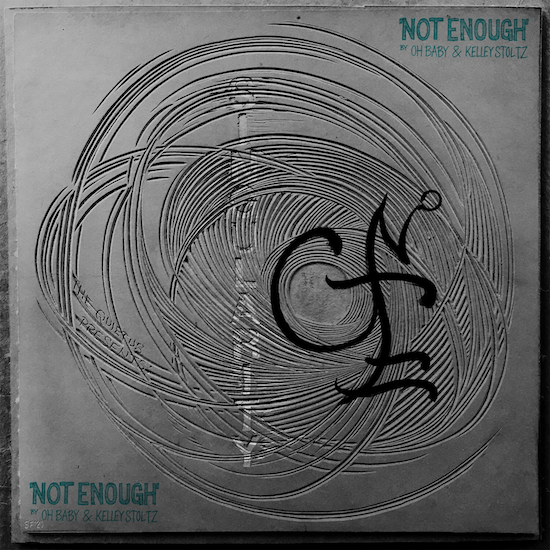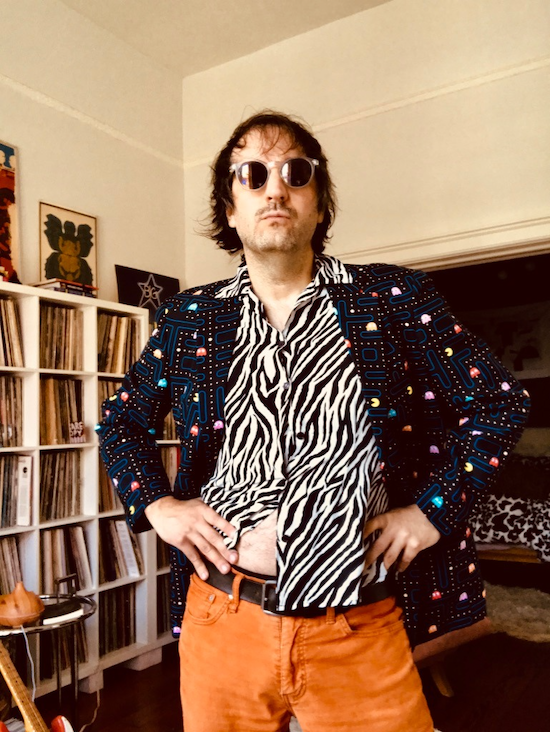Oh Baby, photo by Lucy Morris
To receive Singularity track ‘Not Enough (Extended Mix)’ by Oh Baby and Kelley Stoltz become a Quietus Sound & Vision subscriber
“I think when you write music, there’s always some form of escapism you hope will occur,” says Oh Baby’s Jen Devereux. “It makes you want to be somewhere else, or gives you thoughts of another time or place.” We’re talking about ‘Not Enough (Extended Mix)’, the duo’s kaleidoscopic 17 minute-long track that’s been exclusively remixed by San Francisco musician Kelley Stoltz for tQ’s subscriber exclusive Singularity series. It begins with the line, “Now if you’re going to leave people, you’ll have to have somewhere to go.” It’s an invitation to get lost in a technicolour world populated with pulsing dance beats, glimmering guitars and 80s synths.
The collaboration has been a long time in the making. Oh Baby and Stoltz first met 15 years ago when the latter was touring as economically as possible and hiring local musicians to play in his band. Arriving in England and needing a guitarist, he was introduced to Oh Baby’s Rick Hornby by a mutual friend and hired him “sight unseen”. Stoltz recalls: “We were immediately at ease in each other’s company. It’s crazy because it only feels like it’s been four or five years. It’s gone by so fast.” Hornby recalls his own first impressions, stunned by an American having such an encyclopaedic knowledge of North West English post punk.
tQ speaks to all three via Zoom, with Oh Baby split between Manchester and London, and Stoltz in San Francisco. It’s past dinner time for both Devereux and Hornby, however the day is only starting to take shape for Stoltz. This disparity of time and place, as discovered at various points throughout our conversation, are intrinsically bound on ‘Not Enough’. A California-hued sunshine casts a golden glow across the song’s textures and tones, washing across their contrasting environments and melding them into one. The song’s woozy guitar lines and rhythmic beat are equally indebted to the West Coast bands of the 1960s and 70s and the vibrant Madchester scene, I suggest.
“That was part of the idea,” Hornby says. “I remember Kelley picking-up a Nashville-tuned acoustic and playing these David Crosby-like chords which you hear at the end of the track. We would have never done that.” Responds Devereux: “We wouldn’t have even picked up an acoustic guitar!”
Elaborating on the inspiration behind the track, Hornby continues: “It’s funny you talk about the Madchester thing because I always see what we do as a bit pre-Madchester, more like the early Factory stuff. When we started writing ‘Not Enough’, there was a track called ‘Reach For Love’ by Marcel King [released via Factory Records] and we were obsessed with its bass line. But, you know, I think it still sounds like the place you come from. I’d always liked the idea of people from Manchester wanting to sound like they were from somewhere else; wanting to sound like they were from New York. When we were writing ‘Not Enough’, we wanted to come up with something that’d be played at Paradise Garage or The Fun House, one of those legendary New York clubs from the 1980s.”

Stoltz considers the cultural connections tying America and the UK, both historical and current, and its significance in this partnership. “I would say my West Coast sensibility meets a music I understand which is the Manchester, Liverpool, North West of England sound that I love and try to make myself. I’ve got these hippie chords synonymous with Love, Arthur Lee, The Byrds in me. I think bands like The Stone Roses and The Smiths or Echo & The Bunnymen and Julian Cope, they love artists like David Bowie and Scott Walker or other British-based acts, but they also love Forever Changes, Captain Beefheart, all of those West Coast things. It’s like geographically we’re in the same place. We’re not far away from being the North West of England in the North West of America, at least.”
Stoltz continues, “I think there’s always been a love and fascination with each other’s music from these places. And, it was easy to combine the styles [on ‘Not Enough’]. It never felt like there was a texture that didn’t make sense and when they added something, it wasn’t incongruous to what I’d done. We were coming from the long lineage of these different cultures that have always admired each other. It was an easy fit.”
The fundamental premise of creating a track clocking in at around the 20 minute mark for the Singularity series would also have influence on the way it sounded. When Oh Baby’s original composition was completed, the pair informed their manager. However, when it “completely slipped our minds” that the track needed to be longer (“We had this brilliant four minute track,” Hornby laughs) they went back to the drawing board and “kind of just went to town on it from that point”. They also ventured to Stoltz’s home studio in San Francisco last November. There, they were kept busy working in the studio, opening for him at a gig and even looking after his baby daughter. “In addition to being great musicians, they’re dialled into children’s frequencies and great caretakers, so my wife and I got to have a date,” recalls Stoltz. “They babysat, we cut a track and we did a gig. It was a fantasy week for all of us:”
When asked about some of the challenges faced when working on a composition of this breadth, Hornby reveals they were determined to ensure that the track wouldn’t “become boring”. He says, “We saw this as an opportunity to take that original four minute track and do another version which added some more elements. There’s some new guitar lines and a couple of other bits in there, as well,” Rick explains. “It was an excuse to gather all the ideas that you usually have to cut out or cut down on and throw them back in and keep it interesting. We were also trying to imagine someone on a dancefloor. Again, thinking about somewhere like Paradise Garage or one of those places in an era we never were or have never been, dancing to a song that’s 17 minutes and 20 seconds long.” Adds Devereux, “I think you can actually imagine people doing that when you put it on. It’s so different from anything we’ve done before. We’ve never really been given that type of freedom with a song.”

Kelley Stoltz
This difference in artistic process yielded new responses to their music, too. Hornby describes a feeling of frustration about not being able to revisit material after it’s been recorded and released to audiences, but also an unwavering excitement he feels with each return to this remix: “When we finished the extended mix of ‘Not Enough’, I assumed that I might listen to it twice or three times. I’ve actually listened to it a lot and really enjoy it. It’s easy with something of that length to be objective about it because you can’t remember what’s coming. Even though we made it! It’s such a long piece of music and you can never really get too used to it. It’s always a nice surprise to hear a little tiny drum machine fill or guitar line or chord flash in. I really surprise myself because once something’s made and you’ve recorded it, I can’t really listen to it again.”
On this note, Stoltz outlines his hand in building a world that remains interesting and inviting to Oh Baby. Once again, we return to the idea of finding escape and falling out of step with time and place. “I always think the most successful long-mixes are Giorgio Moroder productions. My knowledge of the perfect template for 18 minute-long disco tracks is pretty limited, especially as someone who has spent a career trying to write shorter and shorter songs! I feel like the only real advice I could offer Jen and Rick was to tell them that there were a lot of cool bits in their original song and to think about Giorgio Moroder and how he was able to build things. How he could take you on a journey and not bore you. I think they did a good job maintaining an escape in the song. Any time you get into an 18 minute-long track you’re gonna go put on a cup of tea, you’re going to walk down the hallway. It’s not for intense absorption. It also needs to have surprises that pop into your head and wake you up to the whole experience so you can just sort of come and go with the whole track as you please. For something at that length, I like when you can take it or leave it and you can drift unconsciously with it.”
To receive Singularity track ‘Not Enough (Extended Mix)’ by Oh Baby and Kelley Stoltz become a Quietus Sound & Vision subscriber
Three other of our recent specially-commissioned music releases, from Slow Tree, Lori Goldston & Laura Cannell and Sly & The Family Drone are still available to those who sign up now.



